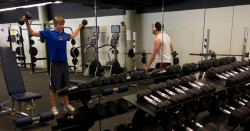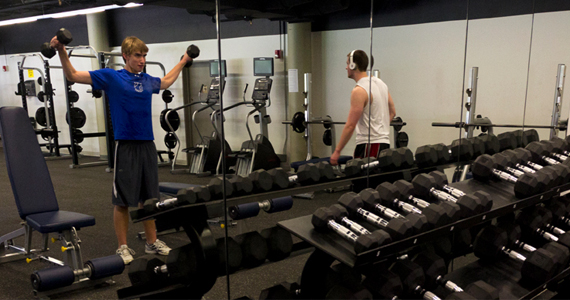
Students initiate projects that enhance their Drake experience and that of future generations
When Terrace Court dining hall closed its doors in spring 2010, University officials had a decision to make: what to do with the 3,000 square-foot space in the lower level of Olmsted Center. Instead of speed-dialing architects and designers, members of Drake’s administration consulted the real experts — Drake students.
Vicky Payseur, vice president for business and finance, had several ideas for the space, which were brought to a Drake Student Senate meeting for discussion. Senate members were encouraged to put more ideas on the table and spent the evening debating the merits of an on-campus post office, meeting space for campus organizations and more. In the end, students showed overwhelming support for a new fitness center.
This past January, when students returned from winter break, they found that their desires had been translated into Underground Fitness, a centrally located, exercise facility open only to students. A student named the facility with a winning entry to a naming contest and Student Senate has already collected feedback and recommended small changes, such as the addition of clocks and scales.
“Students have the power to make things happen,” says LaTasha Stiger, director of campus programming and adviser to the student activities board. “Without our students, we wouldn’t be Drake University.”
Underground Fitness is one of several ways students are influencing and driving change in the Drake community — change that will not only shape their Drake experience but that of Drake students for generations to come.
Taking the Lead
Another student-initiated project shaping the campus community is After Hours, a 24-hour study space in Cowles Library. Scheduled to open in late August, this new space was elevated to the first phase of the Cowles Library renovation in response to students’ requests for a 24-hour gathering and study place.
“Drake is a place where students are cast into the role of making things happen,” says David Karaz, Drake Student Senate campus advancement committee chair. “The atmosphere is collaborative and mobile.”
Karaz, a sophomore majoring in politics and accounting, is currently working with the faculty committee responsible for shaping J-term, a new academic offering that was initiated by students and will start in January 2013. The new program will provide students with innovative and concentrated educational experiences during the University’s winter break. Karaz sees his role as ensuring that the student perspective continues to influence the development of J-term.
“It is an empowering experience,” Karaz says. “This group of faculty is really listening to me and making sure things are in place that will make the processes [of registration and housing] easier for students so they can focus on learning.”
Working Together
This ability to influence change isn’t unique to Karaz. Greg Larson, a senior finance major and president of Drake’s Student Senate, says he meets with Drake President David Maxwell regularly to discuss students’ ideas for campus improvement.
“President Maxwell is the go-to individual,” Larson says. “It’s easy to convey things to him, and he supports rather than directs us.”
That support often includes the financial means ¾ and with it, the accountability ¾ to see things through, such as Dogtown After Hours.
Funded by the administration but conceptualized, implemented and managed by students, the second annual Dogtown After Hours is scheduled for April 13, from 10 p.m. to 1 a.m. Nine student organizations collaborated on organizing the event, and most of their members will converge on Olmsted Center to participate. Students who may not otherwise have opportunities to interact with each other will likely end up connecting at Dogtown After Hours.
“The goal is to bring people together for a common interest and build community among students,” says Jessica Hamilton, chair of the Dogtown After Hours committee and Student Senate vice president of student activities.
Creating Lasting Impact
Building community has been a priority for Hamilton since she ran for office last spring. It was the platform for her campaign and the inspiration for her efforts last fall to promote attendance at athletic events at both home and away games. And although she has enjoyed success, the junior marketing and management major understands that her vision for the campus community may not be fully realized until after she graduates; it will be up to her successors to keep the momentum going.
This idea of picking up where someone left off may sound tenuous, but it works — especially for projects in which students are deeply invested, such as the renovation of Hubbell Dining Hall. The Student Senate was the first to propose the $5 million project, which aimed to transform the north side of Hubbell Dining Hall into a contemporary student gathering space with opportunities for dining, socializing and recreation. The multi-year project, which was driven by students’ suggestions and completed in fall 2010, was promoted by at least three Student Senate administrations and funded by several donors to the University, including the Hubbell family, Hubbell Realty Co., the Windsor Charitable Foundation and Sodexo, Inc.
“Of course it’s nice to see the changes while you are still here,” Larson says. “But then I remind myself of why I ran for Student Senate president: to make a difference. That applies to whether I’m still here to see them or not.”


